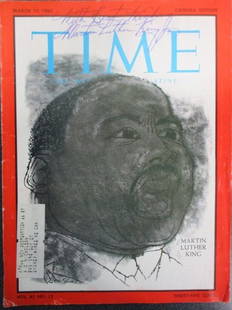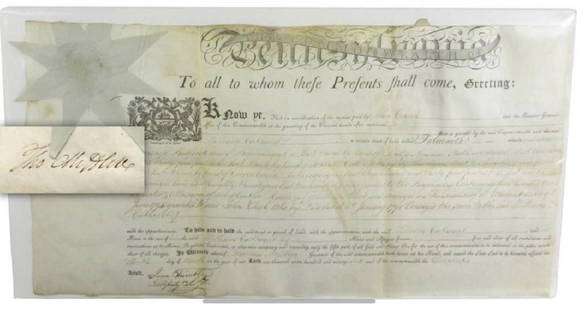
Luther Martin Signed Illegal Whiskey, Constitution
Similar Sale History
View More Items in Political Memorabilia
Related Political Memorabilia
More Items in Political Memorabilia
View MoreRecommended Historical Memorabilia
View More



Item Details
Description
Martin Luther
Founding Father Luther Martin Signs a Bill of Indictment for the Illegal Sale of Whiskey
Single page manuscript document signed, as a Bill of Indictment for the Illegal Sale of Whiskey in Frederick County, Maryland. Signed by Founding Father, "Luther Martin for the State". Frederick County, [MD]: 1794. 7.5" x 4.5". Very good, extremities worn, loss of two letters on the last line, light soiling.
The True Bill, returned by the Jury and its foreman, Stephen Thelmerdine, found that the Spinster Rebecca Hammet, sold one gill of spiritous liquors without a licence for "eight pence current money" to one Joshua Wilson, on Feb. 10, 1794 in Frederick County, Maryland "contrary to the acts of assembly." This was at the height of the avoidance of the Whiskey tax and would lead to the Whiskey Rebellion, eventually put down later that year by George Washington.
Ironically, signing for the State was the Maryland Attorney General Luther Martin (1748-1826), who would be ruined by drink and extravagance and called by Henry Adams the "Notorious Reprobate Genius." Martin served as attorney general of Maryland from 1778 to 1805 and again from 1818 to 1822. Though originally opposed to the Constitution, and one of 16 Delegates to the Constitutional Convention who did not sign, he was a supporter of the Bill of Rights "and the way the federal government took shape under the administrations of Washington and John Adams (1735-1826) impressed him" lessening his antifederalism.
He was a brilliant lawyer, defending Justice Samuel Chase in his impeachment trial in 1805 and was one of the lawyers who defended Aaron Burr at his treason trial in 1807. There is no large collection of Martin papers, although a number of letters are scattered among the collections of the Maryland Historical Society in Baltimore, and the Maryland State Archives in Annapolis has many official papers documenting his public career.
Martin was an early advocate of American independence from Great Britain. In the fall of 1774 he served on the patriot committee of Somerset County, and in December he attended a convention of the Province of Maryland in Annapolis, which had been called to consider the recommendations of the Continental Congress. Maryland appointed Luther Martin its attorney general in early 1778. In this capacity, Martin vigorously prosecuted Loyalists, whose numbers were strong in many areas. Tensions had even led to insurrection and open warfare in some counties. While still attorney general, Martin joined the Baltimore Light Dragoons. In July 1781 his unit joined Lafayette's forces near Fredericksburg, VA., but Martin was recalled by the governor to prosecute a treason trial.
At the Constitutional Convention Martin opposed the idea of a strong central government. When he arrived on June 9, 1787, he expressed suspicion of the secrecy rule imposed on the proceedings. He consistently sided with the small states and voted against the Virginia Plan. On June 27 Martin spoke for more than 3 hours in opposition to the Virginia Plan's proposal for proportionate representation in both houses of the legislature. Martin served on the committee formed to seek a compromise on representation, where he supported the case for equal numbers of delegates in at least one house. Before the convention closed, he and another Maryland delegate, John Francis Mercer, walked out.
In an address to the Maryland House of Delegates in 1787 and in numerous newspaper articles, Martin attacked the proposed new form of government and continued to fight ratification of the Constitution through 1788. He lamented the ascension of the national government over the states and condemned what he saw as unequal representation in Congress. Martin opposed including slaves in determining representation and believed that the absence of a jury in the Supreme Court gravely endangered freedom. At the convention, Martin complained, the aggrandizement of particular states and individuals often had been pursued more avidly than the welfare of the country. The assumption of the term "federal" by those who favored a national government also irritated Martin. Around 1791, however, Martin turned to the Federalist party because of his animosity toward Thomas Jefferson.
Martin's fortunes declined dramatically in his last years. Heavy drinking, illness, and poverty all took their toll. Paralysis, which had struck in 1819, forced him to retire as Maryland's attorney general in 1822. In 1826, at the age of 78, Luther Martin died in Aaron Burr's home in New York City and was buried in an unmarked grave in St. John's churchyard.
WE PROVIDE IN-HOUSE SHIPPING WORLDWIDE!
Founding Father Luther Martin Signs a Bill of Indictment for the Illegal Sale of Whiskey
Single page manuscript document signed, as a Bill of Indictment for the Illegal Sale of Whiskey in Frederick County, Maryland. Signed by Founding Father, "Luther Martin for the State". Frederick County, [MD]: 1794. 7.5" x 4.5". Very good, extremities worn, loss of two letters on the last line, light soiling.
The True Bill, returned by the Jury and its foreman, Stephen Thelmerdine, found that the Spinster Rebecca Hammet, sold one gill of spiritous liquors without a licence for "eight pence current money" to one Joshua Wilson, on Feb. 10, 1794 in Frederick County, Maryland "contrary to the acts of assembly." This was at the height of the avoidance of the Whiskey tax and would lead to the Whiskey Rebellion, eventually put down later that year by George Washington.
Ironically, signing for the State was the Maryland Attorney General Luther Martin (1748-1826), who would be ruined by drink and extravagance and called by Henry Adams the "Notorious Reprobate Genius." Martin served as attorney general of Maryland from 1778 to 1805 and again from 1818 to 1822. Though originally opposed to the Constitution, and one of 16 Delegates to the Constitutional Convention who did not sign, he was a supporter of the Bill of Rights "and the way the federal government took shape under the administrations of Washington and John Adams (1735-1826) impressed him" lessening his antifederalism.
He was a brilliant lawyer, defending Justice Samuel Chase in his impeachment trial in 1805 and was one of the lawyers who defended Aaron Burr at his treason trial in 1807. There is no large collection of Martin papers, although a number of letters are scattered among the collections of the Maryland Historical Society in Baltimore, and the Maryland State Archives in Annapolis has many official papers documenting his public career.
Martin was an early advocate of American independence from Great Britain. In the fall of 1774 he served on the patriot committee of Somerset County, and in December he attended a convention of the Province of Maryland in Annapolis, which had been called to consider the recommendations of the Continental Congress. Maryland appointed Luther Martin its attorney general in early 1778. In this capacity, Martin vigorously prosecuted Loyalists, whose numbers were strong in many areas. Tensions had even led to insurrection and open warfare in some counties. While still attorney general, Martin joined the Baltimore Light Dragoons. In July 1781 his unit joined Lafayette's forces near Fredericksburg, VA., but Martin was recalled by the governor to prosecute a treason trial.
At the Constitutional Convention Martin opposed the idea of a strong central government. When he arrived on June 9, 1787, he expressed suspicion of the secrecy rule imposed on the proceedings. He consistently sided with the small states and voted against the Virginia Plan. On June 27 Martin spoke for more than 3 hours in opposition to the Virginia Plan's proposal for proportionate representation in both houses of the legislature. Martin served on the committee formed to seek a compromise on representation, where he supported the case for equal numbers of delegates in at least one house. Before the convention closed, he and another Maryland delegate, John Francis Mercer, walked out.
In an address to the Maryland House of Delegates in 1787 and in numerous newspaper articles, Martin attacked the proposed new form of government and continued to fight ratification of the Constitution through 1788. He lamented the ascension of the national government over the states and condemned what he saw as unequal representation in Congress. Martin opposed including slaves in determining representation and believed that the absence of a jury in the Supreme Court gravely endangered freedom. At the convention, Martin complained, the aggrandizement of particular states and individuals often had been pursued more avidly than the welfare of the country. The assumption of the term "federal" by those who favored a national government also irritated Martin. Around 1791, however, Martin turned to the Federalist party because of his animosity toward Thomas Jefferson.
Martin's fortunes declined dramatically in his last years. Heavy drinking, illness, and poverty all took their toll. Paralysis, which had struck in 1819, forced him to retire as Maryland's attorney general in 1822. In 1826, at the age of 78, Luther Martin died in Aaron Burr's home in New York City and was buried in an unmarked grave in St. John's churchyard.
WE PROVIDE IN-HOUSE SHIPPING WORLDWIDE!
Buyer's Premium
- 25%
Luther Martin Signed Illegal Whiskey, Constitution
Estimate $800 - $900
Shipping & Pickup Options
Item located in Westport, CT, usSee Policy for Shipping
Payment

Related Searches
TOP























![[African-Americana] King, Martin Luther, Jr. Typed letter, signed: [African-Americana] King, Martin Luther, Jr. Typed letter, signed Martin Luther King, Jr.'s poignant letter to a Pennsylvania-based poet and supporter, sent at a critical moment leading up to the pass](https://p1.liveauctioneers.com/65/259470/135047457_1_x.jpg?height=310&quality=70&version=1661539042)












![Martin Van Buren Signed Letter: [Martin Van Buren 1782-1862] Written in 1832, Van Buren was the [thirteenth] Minister to the United Kingdom, he later became the eight president of the United States. Two leaves, ALS from Martin Van B](https://p1.liveauctioneers.com/179/278425/146476999_1_x.jpg?height=310&quality=70&version=1676064010)


![[CIVIL RIGHTS]. Double-sided memorial banner featuring Martin Luther King, Jr., and John F. Kennedy.: [CIVIL RIGHTS]. Double-sided memorial banner featuring Martin Luther King, Jr., and John F. Kennedy. 18 1/4 x 12 in. two-sided felt banner with machine-stitched binding on one side (very minor wear to](https://p1.liveauctioneers.com/197/329785/177758437_1_x.jpg?height=310&quality=70&version=1715625218)






































